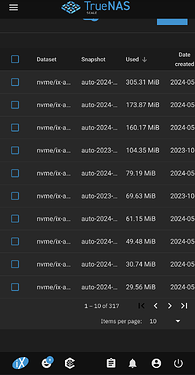*I was getting a warning won my boot pool (2 SSD ZFS Mirror) that I needed to upgrade the pool so I did a zpool upgrade from the shell. I am now getting a message “you might need to update the boot code”. Is this likely to be a problem, or can I ignore this warning. So far I have not rebooted the system for fear that it might not boot.
I have shown the zpool status both before and after the zpool upgrade below.
Guidance would be much appreciated.*
pool: freenas-boot
state: ONLINE
status: Some supported and requested features are not enabled on the pool.
The pool can still be used, but some features are unavailable.
action: Enable all features using 'zpool upgrade'. Once this is done,
the pool may no longer be accessible by software that does not support
the features. See zpool-features(7) for details.
scan: scrub repaired 0B in 00:01:47 with 0 errors on Thu May 9 03:46:47 2024
config:
NAME STATE READ WRITE CKSUM
freenas-boot ONLINE 0 0 0
mirror-0 ONLINE 0 0 0
ada3p2 ONLINE 0 0 0
ada2p2 ONLINE 0 0 0
errors: No known data errors
FN#>zpool upgrade freenas-boot
This system supports ZFS pool feature flags.
Enabled the following features on 'freenas-boot':
draid
Pool 'freenas-boot' has the bootfs property set, you might need to update
the boot code. See gptzfsboot(8) and loader.efi(8) for details.
FN#>zpool status freenas-boot
pool: freenas-boot
state: ONLINE
scan: scrub repaired 0B in 00:01:47 with 0 errors on Thu May 9 03:46:47 2024
config:
NAME STATE READ WRITE CKSUM
freenas-boot ONLINE 0 0 0
mirror-0 ONLINE 0 0 0
ada3p2 ONLINE 0 0 0
ada2p2 ONLINE 0 0 0
errors: No known data errors

